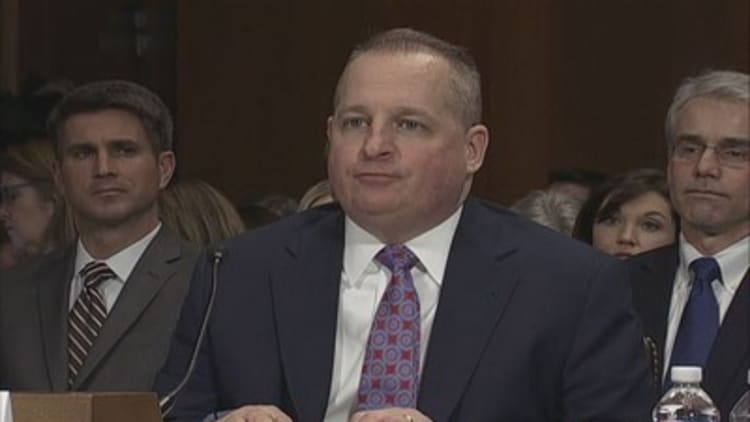Cash—and even checks—may have come back into vogue since the Target security mess, but the example being set by small businesses like San Francisco sandwich shop Split Bread shows that some owners are positioning their registers straight ahead—straight to cashless.
From the low cashier stands placed in the middle of the restaurant to the metal-plated QR codes affixed to each table, the design of the rotisserie sandwich shop was wholly inspired by the owners' desire for a no-cash customer payment system.
"As we were designing the space, we realized that we were designing it around a cash till," said David Silverglide, co-founder of the 20-employee operation. "We stepped back and said, 'Why are we doing this when 70 percent to 80 percent of customer transactions at our other seven [restaurants] are made with credit cards?'"
The harm, following the recent data heists at Target and Neiman Marcus—where millions of consumers' personal information was stolen—is now readily apparent. However, experts say that costs for merchants who process credit cards will skyrocket, and that may be a greater pain than cashless solutions mitigate.
It may be too little too late, but the world's largest credit card companies have set a deadline of next year to switch from traditional magnetic swipe cards to EMV—computer chips embedded into credit cards, which can offer an extra layer of security depending on the way they're used—for point-of-sales transactions. It's a timeline that existed before the Target data breach but has taken on some urgency since: Target this week presented an expedited timeline for its own $100 million investment in EMV during a Senate hearing.
(Read more: The dysfunctional state of America's credit cards)
For thousands of small businesses, that means paying hundreds to thousands of dollars to swap out old terminals for hardware and software that can handle the new credit cards. Given the way these cards are processed—consumers must pause to enter a pin after their card is read—it also means a slowdown in transaction time, which for quick-serve service businesses equals more money lost.
"For the small merchants, it's not really fair—they're asked to pay the cost to upgrade, but they're not really at a huge risk, because of the [relatively small] amount of card information that they have," said Jeff Shanahan, president of payment technology firm CardConnect. "They have to buy into the fact that this is for the greater good of the industry."
Freeing itself from cash can help solve this retail cost/benefit imbalance. Investing in a cloud-based point-of-sales system allows Split Bread to more easily adapt to changes in the marketplace, like capturing sales from the increasing number of American consumers embracing tap-and-pay smartphone apps or complying with new security standards set by the credit card industry.
"We can scale as all these new technologies emerge," said Silverglide. "Cash was the limiting factor."
Building a better credit card trap
Split Bread is well ahead of many of the nation's small businesses, just over half of which still only accept cash or checks. But as more small merchants make the investment to switch to cashless payments systems, Split Bread's payment model—a blend of wireless and traditional payment processing—offers a more cost-effective way to navigate the waters of a historically complicated and expensive market.
(Read more: )

Accepting credit cards has never been cheap or easy for small businesses. Besides the initial cash outlay of a few hundred dollars for hardware, merchants must pay a fee of 2 percent to 3 percent per card swipe, plus a laundry list of monthly and annual costs that banks, credit card companies and merchant service providers tack on.
"They send us the most complicated, hard-to-understand statement ever," said Ben Van Leeuwen of Van Leeuwen Artisan Ice Cream, a 60-employee Brooklyn firm with six ice cream trucks and three retail locations. The company, founded in 2008, started accepting credit cards a year and a half ago. "I can't really spend the hours and months trying to figure out what it means," he said. According to the National Retail Federation, merchants pay about $30 billion each year for debit and credit card purchases, most of which goes to the banks issuing the cards.
Merchants who have invested in cloud-based point-of-sales systems that support swiping credit cards via smartphones or iPads are finding their way around some of the more exorbitant upgrade costs. "New hardware will be needed; that's an undeniable truth about EMV," said John Berkley, vice president of product at Mercury Payment Systems, a payment solutions company based in Durango, Colo. "If you have a piece of hardware that only accepts magstrips, the smaller it is to replace, the better," he said. "When it's a software system with a peripheral attached to it that can easily be swapped out, that's an easier way to make [the upgrade] happen."
(Read more: Time to put chips in U.S. cards: MasterCard)
The costs to switch to EMV will likely be lower for users of Intuit's GoPayment and Square, wireless payment technologies featuring card readers and software that integrate with smartphones and tablets. Both companies already support chip card requirements in Canada (Square) and the U.K. (Intuit).
Fraud magnets
But even as these new technologies, like chip cards and wireless payment, promise a higher level of security with continually evolving encryption measures—for example, like many of its competitors, the GoPayment card reader encrypts credit card numbers and then decrypts them on Intuit's servers so no personal data is ever captured in the software hosted on a merchant's phone—fraudsters will likely find a way to hack into them.
"In other countries where they have required chip-and-pin in brick-and-mortar shops, the fraud risks have moved online," said Jason Richelson, founder of ShopKeep POS, a purveyor of cloud-based point-of-sale software.
Or as Bob Sullivan, fraud expert and contributor to Credit.com, put it: "Here's the thing about crime: It's all a matter of odds. There's no way to prevent it."
Small merchants face a double-edged sword when it comes to fraud protection: They are less at risk than a major national chain like Target, but they also have a known tendency to spend less than their bigger counterparts to protect digital information, making them more susceptible to attacks.
The first defense against risks associated with wireless—things like malware targeted at mobile devices and the lack of time-tested fraud controls configured specifically for mobile—is education. "Most merchants don't spend the time or effort to get educated, and that's to their detriment," said Steve Casco, founder and CEO of Cardnotpresent.com, an online publication that covers issues in the e-commerce and mobile payments industries. "We're trying to bring our readers into the 20th century, let alone the 21st."
The majority of small firms rely on their vendors for infrastructure security updates, and partnering with a well-known tech company can help ease client worries about security weaknesses with new technologies. "That's one of the reasons why we wanted to go with a company like PayPal," said Justin Joseph, a partner and CFO of EJ Blooms, a start-up floral design firm in Manhattan that only accepts plastic via PayPal Here to serve clients, including Viacom and the New York Historical Society. "Most people will have heard of it and know they can trust [the system]."
When Silverglide first deliberated on the decision to go straight to cashless, he asked himself, "What's the harm of getting rid of cash already and see what it does for our operation?"
It did quite a bit. Despite the occasional customer grumbling about not being able to use cash, Split Bread has seen well over double-digit sales growth month over month since opening a year and a half ago. Silverglide attributes some of that growth to fostering an electronic payments–only business, which allows for quicker customer throughput—if they don't want to stand in line and swipe their credit card to pay, customers can seat themselves at a table, scan the QR code with their smartphone and order without having to interact with staff—and less time and labor wasted with counting, watching over and depositing cash.
—Maggie Overfelt, Special to CNBC.com




